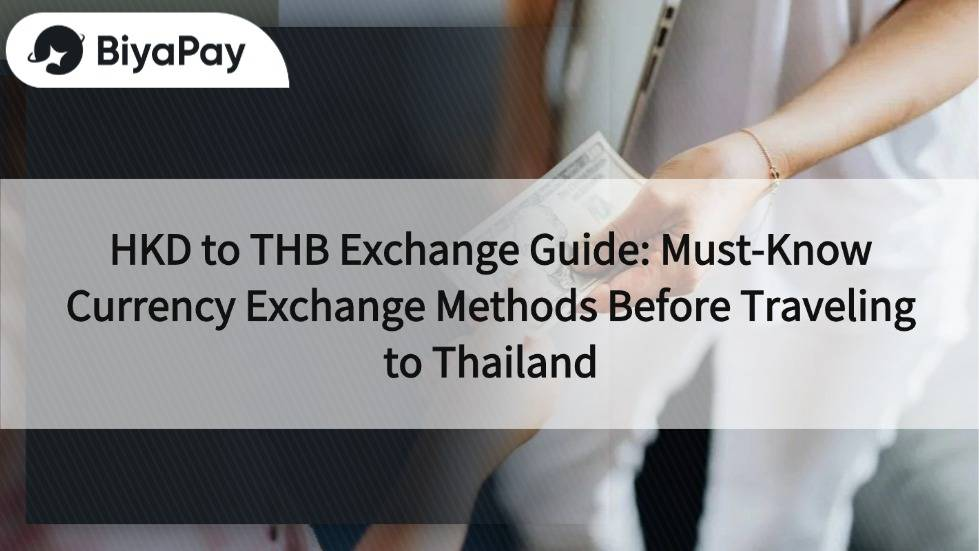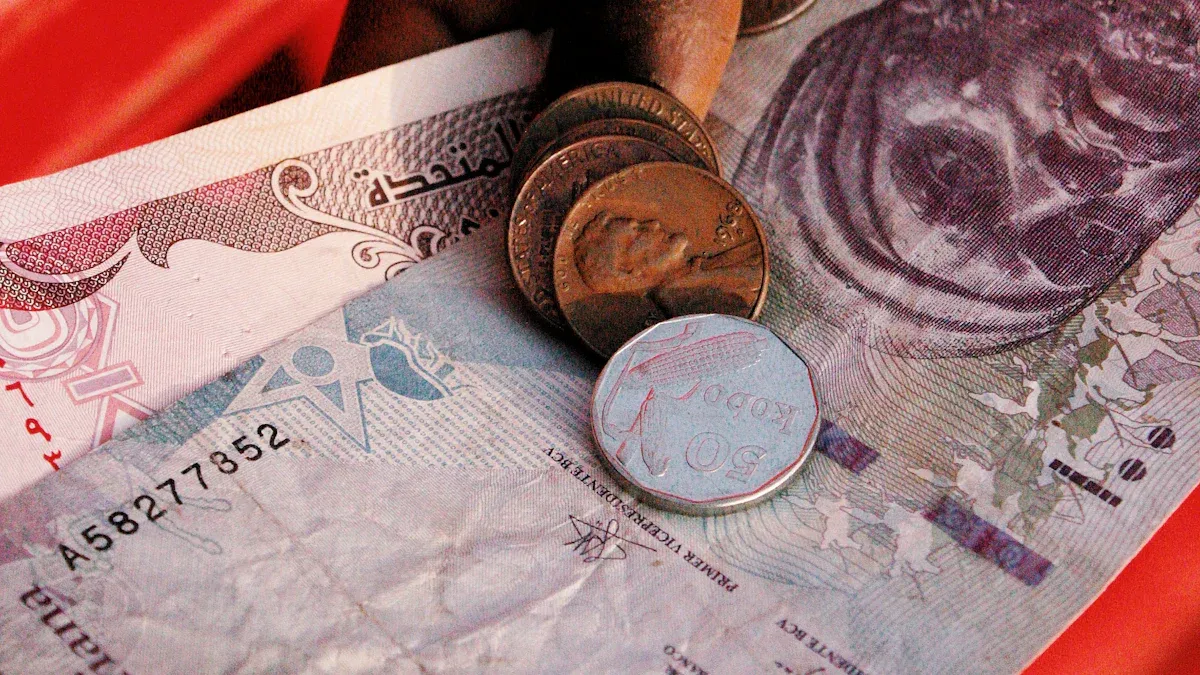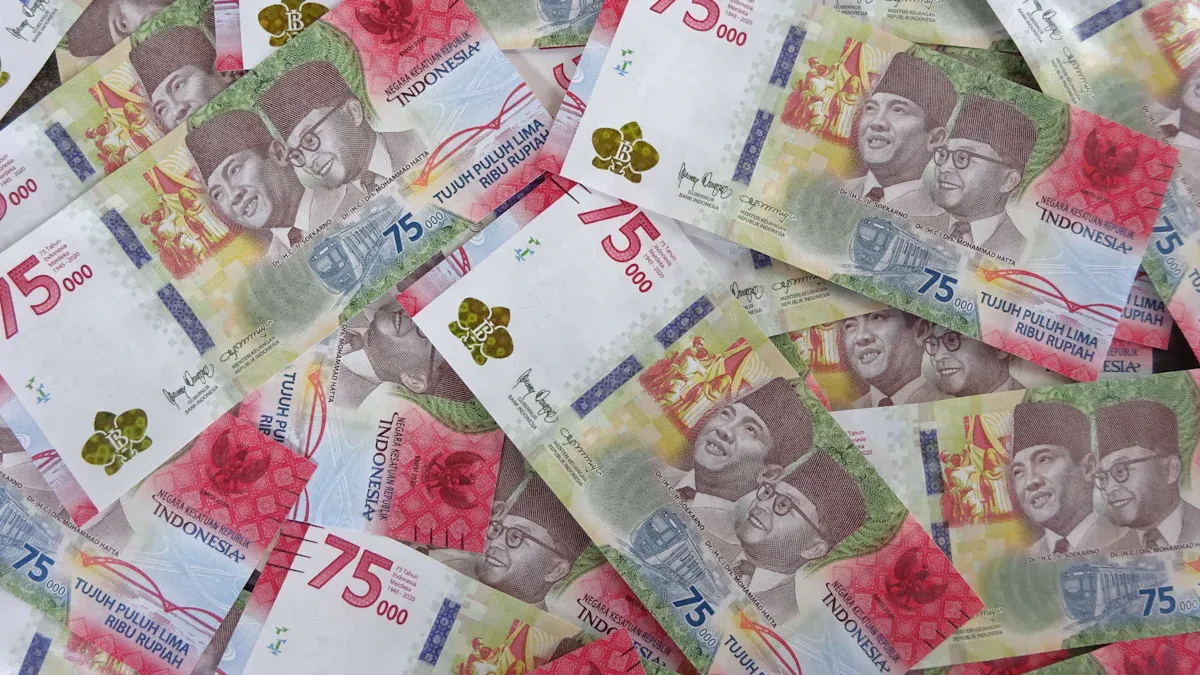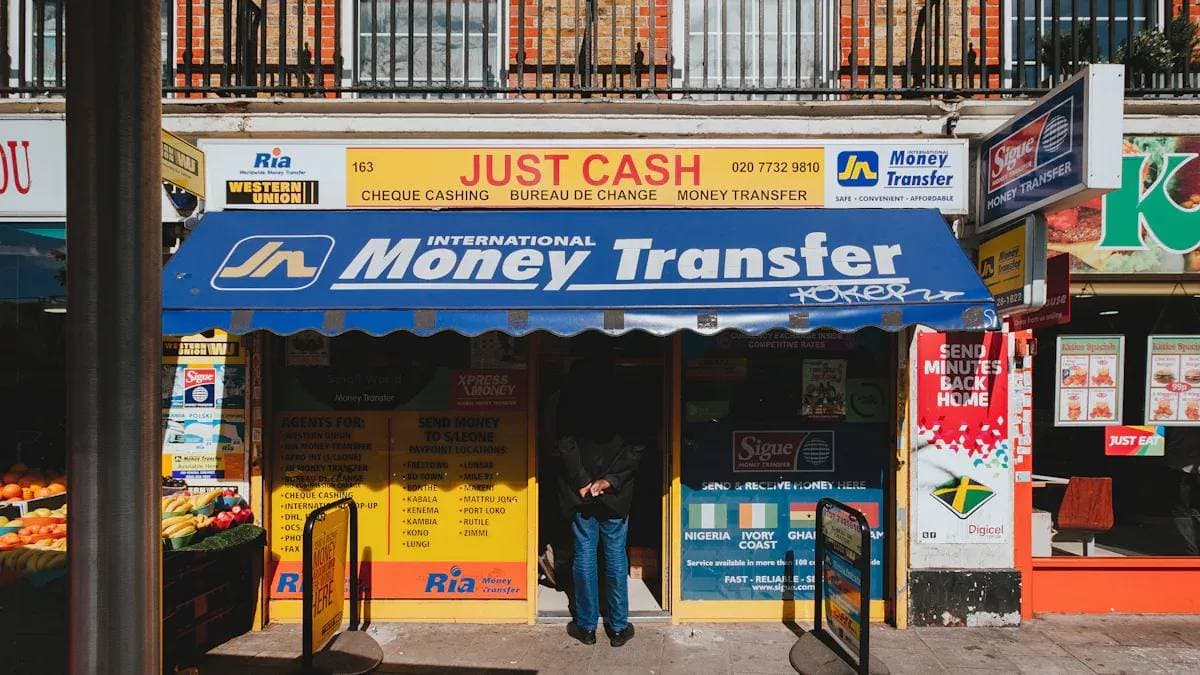- EasyCard
- Trade
- Help
- Announcement
- Academy
- SWIFT Code
- Iban Number
- Referral
- Customer Service
- Blog
- Creator
HKD to THB Exchange Guide: Must-Know Currency Exchange Methods Before Traveling to Thailand

Image Source: unsplash
When you plan to travel to Thailand, there are many ways to exchange HKD to THB. You can consider money changers, Hong Kong banks, online exchange platforms, airport exchange counters, or even exchanging money in Thailand. Money changers usually offer better rates, but you need to pay extra attention to safety and authenticity. Hong Kong banks charge higher fees but provide assured safety. Online exchanges are convenient and fast, suitable for those accustomed to online operations. Airport exchanges are suitable for emergencies but offer poorer rates. When choosing, you should compare rates, fees, and safety.
Key Points
- There are multiple ways to exchange HKD to THB, including money changers, banks, online platforms, and airport exchanges, each with its pros and cons.
- Money changers offer better rates but require caution for safety and counterfeit risks, banks are safe but have higher fees, and online exchanges are convenient with transparent fees.
- Airport exchanges are convenient for emergencies, but rates are poor, so it’s recommended to exchange only a small amount for initial expenses.
- Before exchanging, compare rates and fees, exchange in batches to reduce the risk of carrying large amounts of cash, and keep receipts for verification.
- Use reputable exchange channels and learn to identify THB authenticity to ensure safe exchanges and a smooth trip.
Main Exchange Methods
When you exchange HKD to THB in Hong Kong, you can choose from multiple methods. Each method has different convenience levels, rates, and fees. You should choose the most suitable exchange channel based on your needs.
Money Changers
You can exchange cash at money changers in Hong Kong. These shops usually offer flexible services, with some locations like Century Money Changer in Central offering rates around 1 HKD to 4.35 THB, better than most Hong Kong banks. Some money changers have no explicit fees, but rates may vary. You should book in advance and choose reputable shops.
| Exchange Location | Rate (HKD to THB) | Fee Description |
|---|---|---|
| Century Money Changer in Central | 4.35 | Booking available, better rates |
| Hong Kong Roadside Money Changers | Around 4 or lower | Poorer rates, no explicit fees |
Banks
You can also exchange money at Hong Kong banks. Banks offer high safety but generally lower rates, such as HSBC offering around 1 HKD to 4.2 THB. Some banks require advance booking, or you may not be able to exchange THB. Banks typically charge a fee of 100 to 300 HKD (approximately USD 12.8 to 38.5). You should note the bank’s operating hours and fee policies.
Online Exchanges
Online exchange platforms allow you to check rates and place orders anytime. You can book online and collect cash at designated branches or airports. This method is convenient and fast, with rates similar to bank counters, and some platforms waive fees, but you need to collect the cash in person.
Airport Exchanges
You can exchange money at Hong Kong or Thailand airports. Airport exchanges are highly convenient, suitable for last-minute needs, but rates are usually poor, with limited currency and denomination options. Fees may be higher, with some airport branches charging fixed fees.
| Exchange Method | Fees | Advantages | Disadvantages |
|---|---|---|---|
| Airport Exchange | Potentially high | Convenient and fast | Poor rates, limited options |
Local Exchanges in Thailand
You can also exchange money at money changers in Thailand. Well-known Thai money changers like Superrich offer rates around 1 HKD to 4.44 THB, typically with no explicit fees. When exchanging in Thailand, rates are generally better than in Hong Kong, but you need to watch out for counterfeit risks and cash safety.
Note: Currently, there is no public data or report comparing the fees and rate differences of various exchange methods in detail. You can refer to real-time quotes from banks, money changers, and platforms, and pay attention to related fees and risks disclosed in documents like fund prospectuses.
HKD to THB Rate Comparison

Image Source: pexels
Rate Inquiry Methods
If you want to know the latest HKD to THB exchange rates, you can use multiple methods to check. The most direct method is to visit the official websites of Hong Kong banks, such as HSBC or Hang Seng Bank. These websites update the cash buy and sell rates for HKD to THB daily. You can also use international remittance platforms like Wise (formerly TransferWise), which display rates based on Refinitiv’s market mid-rate, closer to actual market trading levels.
You can also download mobile apps like XE Currency or OANDA, which allow real-time HKD to THB rate checks. Before departing or upon arriving in Thailand, you can use your phone to check the latest rates anytime, making it easy to compare prices across different exchange channels.
Tip: When checking rates, remember to note the difference between the “buy rate” and “sell rate.” The buy rate is the price money changers or banks offer when you exchange HKD for THB. The sell rate is the price when you exchange THB back to HKD. The gap between them is the profit source for exchange providers.
Fee Comparison
When choosing an exchange channel, besides rates, you should also compare fees. Different channels have varying fee structures and charging methods. Below is a comparison of fees for common channels:
- Wise’s exchange fees consist of fixed and variable components. Before placing an order, the platform clearly displays all fees, making the fee structure highly transparent. Wise’s rates are based on the market mid-rate, usually fairer than Hong Kong banks and airport money changers. Wise adjusts fees based on different transfer routes, with over 2,500 transfer routes globally, and fees vary by region. Using Wise to exchange HKD to THB typically saves on fees and time.
- Cash exchanges or wire transfers at Hong Kong banks generally have higher fees. Banks charge fixed fees (e.g., USD 12.8 to USD 38.5 per transaction) and sometimes add percentage-based fees. Traditional bank wire transfers go through multiple intermediary banks, each potentially charging additional fees, increasing total costs. When exchanging at banks, fees may not be immediately visible, making charges less transparent.
- Airport money changers’ fees are usually embedded in the rate spread. You may not see explicit fees, but the rates reflect the costs. Exchanging HKD to THB at airports often results in higher overall costs compared to city money changers.
- Thai local money changers like Superrich typically don’t charge explicit fees, but rates include their profit. When exchanging in Thailand, rates are generally better than Hong Kong banks and airports, but you need to watch for counterfeit risks.
| Exchange Channel | Rate Transparency | Fee Structure | Reference Fees (USD) | Convenience |
|---|---|---|---|---|
| Wise | High | Fixed + variable, transparent | Around 1-2% or lower | Online operation, fast |
| Hong Kong Banks | Medium | Fixed + possibly variable | USD 12.8–38.5 per transaction | Safe, requires booking |
| Airport Money Changers | Low | Fees embedded in rates | Large rate spread | Convenient, suitable for emergencies |
| Thai Local Money Changers | Medium | Fees embedded in rates | Usually no explicit fees | Better rates |
Suggestion: When exchanging HKD to THB, check real-time rates and fees across multiple channels first. You can use online platforms to compare prices and choose the most cost-effective method. Calculate all fees before deciding to save on travel expenses.
Money Changers
Recommended Locations
You can find many reputable money changers in Hong Kong. Central, Tsim Sha Tsui, and Mong Kok are popular areas. Money changers in these areas face fierce competition, often offering better HKD to THB rates. For example, Century Money Changer in Central and Wing Lung Money Changer in Tsim Sha Tsui are highly popular. You can check real-time rates online and choose the most suitable location. Some money changers support online booking, allowing you to lock in rates and reduce waiting time on-site.
Exchange Process
The process of exchanging money at a money changer is simple. You need to bring valid identification (e.g., Hong Kong ID or passport). You tell the staff the amount and currency you want to exchange, such as HKD to THB. The staff will provide a quote and inform you of the THB amount you’ll receive. After confirming the rate and amount, you hand over the HKD cash to the staff. The staff counts the cash and hands you the THB cash. You should count the THB on the spot to ensure the amount is correct. Some money changers provide receipts, which you can request.
Precautions
When exchanging at money changers, pay attention to the following points. First, choose shops with good reputations and long operating histories, avoiding transactions at remote or unlicensed money changers. You should compare rates from multiple money changers to select the best HKD to THB price. Be aware of counterfeit risks and check the authenticity of THB immediately after receiving it. You should not carry large amounts of cash at once; exchange in batches to ensure personal property safety. If you have doubts, you can check rate information with Hong Kong banks for reference.
Banks
Cash Exchange
You can go directly to a Hong Kong bank branch to exchange THB with cash. This method is safe and reliable, suitable for those needing large amounts of cash. You only need to bring identification documents and specify the exchange amount at the counter. The bank calculates based on the day’s rate and delivers THB cash immediately. Note that bank exchange rates are usually slightly lower than money changers. Some banks may charge a fee of about USD 13 to USD 39 per transaction. You should check the bank’s operating hours and book the required amount in advance to avoid shortages.
Wire Transfer
You can also choose wire transfers to send HKD or USD directly to a Thai bank account. This method is suitable for those needing to transfer large amounts. Wire transfer fees are higher, typically around USD 64 to USD 128 per transaction, plus telex and miscellaneous fees. You should also note the rate spread and buy-sell spread, which are hidden costs. The wire transfer process takes 1 to 3 business days to complete. You should ensure the recipient’s details are正確 and keep the transfer receipt.
Tip: Wire transfers are suitable for paying hotel deposits or large expenses but not recommended for small exchanges due to high fees.
- Wire transfer fees are fixed and relatively high
- Rate spread and buy-sell spread are hidden costs
- Takes 1 to 3 business days to complete
Online Banking
You can use Hong Kong banks’ online banking services for currency exchange or remittances. This method is convenient and fast, suitable for those accustomed to online operations. Online banking transfer fees are usually based on ATM transfer standards, lower than wire transfers. Some banks offer promotional activities to waive fees. You can operate from 9 AM to 3:30 PM on business days, with a single and daily limit of about USD 96,000 (based on a 1:30 rate). If a transfer is rejected, no fees are charged before the telex is sent. You can check transfer status anytime and download or collect transfer receipts at branches.
- Online banking fees are lower, with promotions in some cases
- Operating hours are limited, with amount caps
- Allows instant transfer status checks, convenient for fund management
Note: When exchanging at banks, compare rates and fees from different banks to choose the most suitable method.
Online Exchanges
Recommended Platforms
You can choose multiple online exchange platforms to exchange THB. Common platforms include Wise, Travelex, OFX, and online foreign currency services from some Hong Kong banks. Wise is known for transparent rates and low fees, suitable for those needing instant inquiries and transfers. Travelex supports online booking, allowing you to collect cash at airports or designated locations. OFX is suitable for large transfers with lower fees. Some Hong Kong banks also offer online currency exchange, making it convenient to operate online.
| Platform | Main Advantages | Suitable For |
|---|---|---|
| Wise | Transparent rates, low fees | Online operation users |
| Travelex | Cash pickup at airports | Travelers |
| OFX | Suitable for large transfers | Business or large-amount needs |
Operation Steps
When exchanging online, the steps are very simple. First, you need to register an account and complete identity verification. Then, you enter the exchange amount and select the currency. The platform will instantly display the rate and all related fees. After confirming the details, you choose a payment method (e.g., bank transfer or credit card). Finally, you submit the order and wait for the platform to process it. Most platforms complete the exchange within 1 to 2 business days.
Tip: Compare rates and fees across platforms before placing an order to choose the most cost-effective option.
Collection Methods
After completing an online exchange, you can choose different collection methods. Some platforms support cash pickup, allowing you to collect THB cash at airports or designated branches. Some platforms transfer THB directly to your Thai bank account, suitable for long-term travelers or those with local accounts. You can also transfer funds to a third-party account, such as friends or hotels. When collecting cash, bring identification documents and order confirmation.
Note: When collecting cash, count the amount on the spot and check the authenticity of the notes to protect your interests.
Airport Exchanges

Image Source: pexels
Hong Kong Airport
You can find multiple exchange shops and bank counters at Hong Kong International Airport. These counters are usually located in the departure and arrival halls. You can instantly exchange HKD for THB cash. The biggest advantage of airport exchanges is convenience, especially for those needing cash urgently. However, airport rates are generally poorer than city money changers. For example, when city money changers offer 1 USD to 30 THB, airports may offer only 1 USD to 28 THB. Some counters charge fixed fees of about USD 5 to USD 10. You should ask about rates and all fees before exchanging.
Tip: Check real-time rates of Hong Kong airport exchange shops online first to choose the most favorable counter.
Thailand Airport
After arriving in Thailand, you can exchange THB at airport exchange counters. Thai airport exchange points are located in arrival halls and baggage claim areas. You can use USD, HKD, or other major currencies to exchange THB. Thai airport rates are usually slightly better than Hong Kong airports but still not as good as city money changers. For example, Thai airports may offer 1 USD to 31 THB, while city money changers can reach 1 USD to 32 THB. When exchanging at airports, exchange only enough for transportation and first-day expenses. Exchanging more THB at city money changers later is more cost-effective.
| Location | Reference Rate (USD:THB) | Fees (USD) | Suggested Use |
|---|---|---|---|
| Hong Kong Airport | 1:28-ox | 5–10 | Emergency, small-amount exchange |
| Thailand Airport | 1:31 | 0–5 | Transportation, first-day expenses |
| City Money Changers | 1:32 | 0–2 | Large-amount exchange |
Emergency Exchange Tips
When exchanging at airports, note the following points:
- Exchange only enough for transportation, accommodation deposits, and first-day dining expenses.
- Keep exchange receipts for future verification or returns.
- Check the authenticity of notes on the spot when counting cash.
- Avoid exchanging at unofficial counters or with strangers for safety.
- If you forget to exchange in Hong Kong, you can use a credit or debit card at Thai ATMs to withdraw THB, but note bank fees, typically around USD 5 to USD 8 per transaction.
Note: Airport exchanges are suitable for emergencies or last-minute needs. When planning your trip, prioritize city money changers or online platforms for better rates and lower fees.
Exchange Precautions
Counterfeit Risks
When exchanging THB, you must be especially cautious of counterfeit risks. Some money changers or informal channels may circulate fake notes. You should choose reputable exchange channels, such as major Hong Kong money changers or well-known banks. After receiving THB cash, check the authenticity immediately. You can observe watermarks, security threads, and paper texture. Thai banknotes have multiple anti-counterfeit features, such as transparent windows and embossed printing. If you notice anything unusual, report it to the staff or seek assistance immediately.
Tip: Refer to the Bank of Thailand’s official website for anti-counterfeit tutorials to learn how to identify genuine notes. Avoid exchanging on the street or with strangers to significantly reduce the risk of receiving fake notes.
Cash Safety
When carrying large amounts of cash, safety cannot be overlooked. You should store cash in batches, avoiding keeping all cash in one place. You can use anti-theft waist pouches or body bags to carry some cash securely. In hotels, use safes to store excess cash. When going out, carry only the amount needed for the day to reduce loss risks. Be especially vigilant against pickpockets in crowded areas or on public transport. If you lose cash, it’s usually hard to recover.
| Safety Suggestion | Method |
|---|---|
| Store Cash in Batches | Keep cash in carry-on, luggage, and hotel safe separately |
| Use Anti-Theft Waist Pouch | Carry close to the body to reduce theft risk |
| Carry Only Needed Amount | Bring only the daily budgeted cash when going out |
| Keep Receipts | Retain exchange receipts for verification |
Note: Avoid exchanging money late at night or in remote locations; choosing busy, monitored exchange locations is safer.
Suggested Exchange Amounts
When planning exchange amounts, make reasonable arrangements based on trip duration and spending habits. You don’t need to exchange too much cash at once, as money changers and ATMs are common in Thailand. Exchange enough initially for transportation, accommodation deposits, and first-day expenses, then exchange in batches as needed. This reduces the risk of carrying large amounts of cash.
If you prefer digital exchange platforms, transaction safety and convenience are higher. According to 2024 data, over 99% of digital forex transactions are completed online, showing digital exchanges have become mainstream. The number of digital exchange accounts and transaction amounts grow steadily each year, with transaction safety widely recognized. You can use rate alerts or currency price notifications from Hong Kong banks or international platforms to seize the best exchange timing and reduce losses from rate fluctuations.
- Digital exchange transactions have a high share and strong safety
- Digital exchange accounts and amounts grow yearly
- Diverse features help you track rate information, enhancing convenience
Suggestion: Exchange in batches based on actual needs to avoid exchanging too much cash at once. Use digital exchange platforms to enhance transaction safety and efficiency. When choosing exchange channels, prioritize reputable Hong Kong banks or well-known online platforms to effectively avoid common pitfalls.
When choosing an exchange method, make judgments based on your needs. Money changers offer better rates, banks provide high safety, and online platforms like Wise combine efficiency and security.
- Wise offers multiple exchange methods with varying fees and speeds. Low-cost transfers and Advanced transfers have lower fees but take longer, while Fast and Easy transfers are quicker but more expensive. Wise has over 8 million users and monthly exchange volumes exceeding GBP 4 billion, with high safety and good user experience.
- German students using Wise for currency exchange saved about USD 25, showing its rate and fee advantages.
When exchanging HKD to THB, compare rates and fees thoroughly. Experts and market surveys recommend keeping receipts, exchanging in batches, and choosing reputable channels. These tips come from extensive data analysis and expert experience, helping you reduce risks. Based on your trip duration and spending habits, flexibly choose the most suitable option for a worry-free trip.
FAQ
1. How much cash should you bring to Thailand?
You can bring USD 100 to USD 300 in cash, sufficient for transportation and first-day expenses. Afterward, exchange THB in batches at local money changers or ATMs.
2. What’s the difference between exchanging THB in Hong Kong and Thailand?
You usually get better rates at Thai city money changers, e.g., 1 HKD to 4.44 THB, compared to about 4.35 THB at Hong Kong money changers.
3. Is it cost-effective to use a credit card in Thailand?
Using a credit card is convenient, but banks settle at the daily rate and charge about 1% to 3% fees. Check your issuing bank’s fee details.
4. How do you avoid receiving counterfeit notes?
Choose reputable money changers or banks. Check watermarks, security threads, and paper texture immediately after receiving THB. If suspicious, inquire with the staff instantly.
5. Which online platforms can you use to exchange THB?
You can use Wise, Travelex, or Hong Kong banks’ online foreign currency services. These platforms offer transparent rates and low fees, suitable for online users.
Exchanging HKD to THB offers various options, from competitive rates at money changers to secure bank transactions, but comparing rates and fees is crucial for savings. BiyaPay simplifies your currency exchange, offering transfer fees as low as 0.5% and supporting cross-border payments to over 190 countries, perfect for Thailand travel needs. Real-time exchange rate queries ensure transparent costs, eliminating the hassle of multi-channel comparisons.
With support for multiple fiat and digital currency conversions and fast registration, BiyaPay is regulated internationally for secure transactions. Visit BiyaPay today for cost-effective, seamless exchange services, making your Thailand trip worry-free!
*This article is provided for general information purposes and does not constitute legal, tax or other professional advice from BiyaPay or its subsidiaries and its affiliates, and it is not intended as a substitute for obtaining advice from a financial advisor or any other professional.
We make no representations, warranties or warranties, express or implied, as to the accuracy, completeness or timeliness of the contents of this publication.




Contact Us
Company and Team
BiyaPay Products
Customer Services
is a broker-dealer registered with the U.S. Securities and Exchange Commission (SEC) (No.: 802-127417), member of the Financial Industry Regulatory Authority (FINRA) (CRD: 325027), member of the Securities Investor Protection Corporation (SIPC), and regulated by FINRA and SEC.
registered with the US Financial Crimes Enforcement Network (FinCEN), as a Money Services Business (MSB), registration number: 31000218637349, and regulated by FinCEN.
registered as Financial Service Provider (FSP number: FSP1007221) in New Zealand, and is a member of the Financial Dispute Resolution Scheme, a New Zealand independent dispute resolution service provider.




















